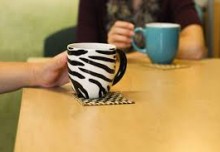 Confusion usually means we are not getting something right, but in physical training and even physical therapy, muscle confusion can be the best thing to help your body stay on your feet, lift properly, and more. We got a lot of insights on “muscle confusion” from our guest writer today, Victor Colon, a professional trainer here on the Northshore. Victor has his B.S. in kinesiology, the study of human movement, and he is certified as a personal trainer with the National Academy of Sports Medicine, and he also is certified as a Corrective Exercise Specialist and Performance Enhancement Specialist. And did I mention that September is Healthy Aging Month? Let Victor tell you the rest of what can be done to help an older loved or yourself confuse your muscles into helping you be in better shape:
Confusion usually means we are not getting something right, but in physical training and even physical therapy, muscle confusion can be the best thing to help your body stay on your feet, lift properly, and more. We got a lot of insights on “muscle confusion” from our guest writer today, Victor Colon, a professional trainer here on the Northshore. Victor has his B.S. in kinesiology, the study of human movement, and he is certified as a personal trainer with the National Academy of Sports Medicine, and he also is certified as a Corrective Exercise Specialist and Performance Enhancement Specialist. And did I mention that September is Healthy Aging Month? Let Victor tell you the rest of what can be done to help an older loved or yourself confuse your muscles into helping you be in better shape:
“It ultimately comes down to “if you don’t use it you lose it.” But how do you “use it?” There really are just six core movement patterns to use to keep fit and nimble:
- Push – vertical and horizontal – these are the basics like pushup ups for the vertical and variations on the same movement for the horizontal complement.
- Pull- vertical and horizontal – for the vertical part, think of pull-ups or a modified form and for the horizonal think of a rowing machine.
- Squat – is a “hips down” motion. Keep your back flat, developing range of motion that will take you to “rock bottom.” You will not use much forward lean here as your hips are more directly under you.
- Lunge – this is a long, linear stride, lowering your back knee to just above the ground, with a completely upright torso. Lunges require more core strength to stand up than the squat and deadlift. It’s easy to forget that walking is really just controlled falling, so a lunge is just an exaggerated stride…also without falling.
- Hinge – these are the movements that require muscle groups to work together as we contract our muscles to “curl weights” and this can be contracting in or relaxing out to reverse the motions.
- Rotate – this is where we use some of those unique neck, shoulder or hip muscles to do 3-D exercises that make us so uniquely human.
Do you have difficulty hoisting your carry-on luggage to the overhead compartment, keeping your balance as you rise from sitting in that comfortable chair or jogging up a flight of stairs? An effective training program will redevelop the mobility of all these basic motions and then proceed to do these movements more times and perhaps lift more weight by adding repetitions and sets of multiple repetitions. Only weight lifters focus on just the amount they are lifting or pressing. An effective training program that is about being more versatile, strong and nimble is built on the number of times and the variety of types of movements.
At the end of the day, have a program, work with someone to educate yourself, make it fun for you to continue for a lifestyle, and reap all the benefits that you want and didn’t know you could achieve! When taking on a serious training protocol, think of it as learning to crawl before you can walk and before you can run. Give your mind and body something to work toward, because it’s good for you physically, mentally and emotionally. Your activities of daily living will seem far easier, you’ll be more durable, you’ll be stronger and your quality of life will be extended along with your quantity of life – your age.
If you’re looking to level up from where you are at today please feel free to contact me by way of info@creativecaremanagement.com for a free fitness consult and from there we can plan out your training program and get you closer to winning in the game of life!!”
Charlotte Bishop is an Aging Life Care Advisor, Geriatric Care Manager and founder of Creative Care Management, certified professionals who are geriatric advocates, resources, counselors and friends to older adults and their families in metropolitan Chicago. She also is the co-author of How Do I Know You? A Caregiver’s Lifesaver for Dealing with Dementia.






